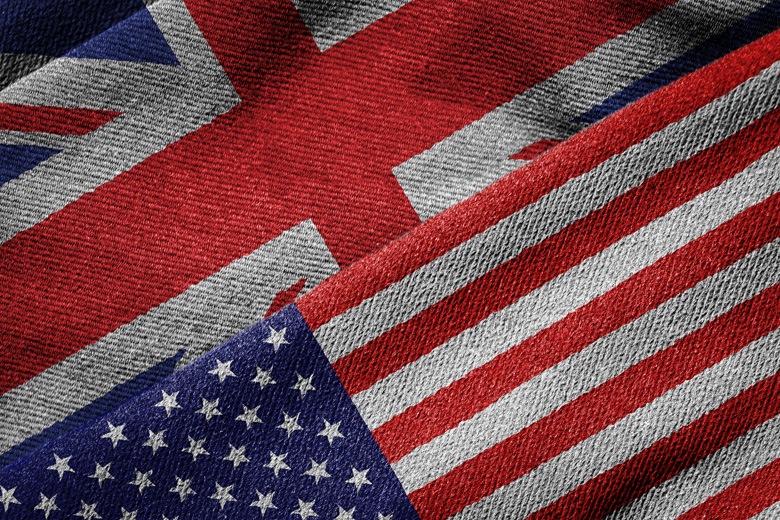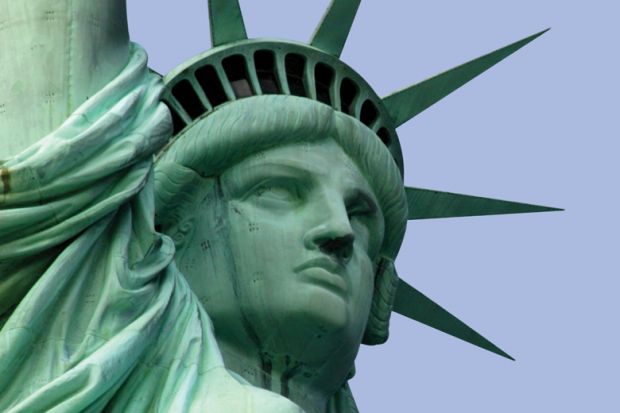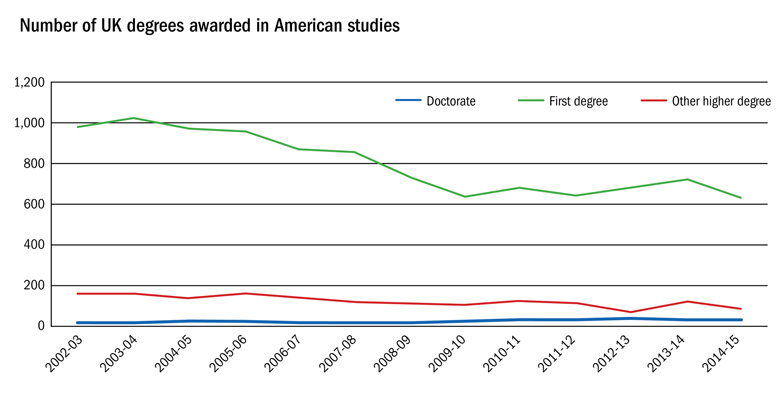“The ocean is very wide,” says the American narrator of James Baldwin’s 1956 novel Giovanni’s Room. “We have led different lives than you, things have happened to us there which have never happened here. Surely you can understand that this would make us a different people?”
In return, his European interlocutor muses about “all the serious, dreadful things, like pain and death and love, in which you Americans do not believe”.
“What makes you think we don’t?” rejoins the American.
Here is one purpose of American studies: to make the foreign human. The American experience has yielded a very different culture, but one whose putative distinctions often dissolve into mist upon closer examination.
Conversely, American studies serves to make the familiar foreign. Given the global saturation of American music, television and film, anyone may feel confident that they understand the US well. That can be deceiving, however, for American culture, like an onion, has many layers.
This explains the professional and intellectual draw of American studies, which is very much alive and thriving in British universities. No fad, it holds a pedigree dating back six decades. The British Association for American Studies, founded in 1955, still sponsors The Journal of American Studies, issued continuously by Cambridge University Press since 1967. Specialist societies – such as the American Politics Group, Historians of the Twentieth Century United States, the Association of British American Nineteenth Century Historians and the British Association of Nineteenth Century Americanists – are augmented by research nodes such as the British Library’s Eccles Centre for American Studies and the Rothermere American Institute at the University of Oxford.
To judge by the number of undergraduate degrees awarded, however, American studies is in marked decline. Peaking at 1,020 graduates in 2003‑04, the number fell to 635 in 2008‑09. It drifted upwards to 720 by 2013‑14, but fell back in 2014‑15 to match the previous low point of 635, a nearly 40 per cent plunge over 12 years. The number of higher degrees awarded tells a similar story, falling by a third to 120 by 2014‑15 (see graph, below).
What explains this? One cause may be fluctuation in the US image abroad, corresponding to presidential administrations. The years between 2003 and 2009, when the graduate decline was greatest, were those of George W. Bush and his Iraq War. A notorious Polly Toynbee column in The Guardian in those years called American studies “a degree in bullying and self-interest”. The upward trend from 2009 to 2014, conversely, suggests a Barack Obama bounce, as the US got back at least part of its coolness. (One shudders to imagine the effects of a Donald Trump presidency.)
Or is the better explanation economic? The peak year of 2004 was a consequence of applications to university made by 18-year-olds in 2000‑01, the crowning moment of the American-led financial bubble of the 1980s and 1990s, when stock valuations soared on both sides of the Atlantic and Anglo-American market-touting elites in the Thatcher-Reagan and Clinton-Blair decades basked in mutual admiration.
Since then, both student career prospects and the lustre of the US economy have receded. The dot-com implosion in 2001 was followed by the global financial crisis in 2008, centred on Wall Street. As employment prospects contracted, parents and students became more sceptical of virtually any degree bearing the ominous word “studies” and showed a preference for technical, business or professional degrees, a pattern reinforced by the recent tripling of university tuition fees.
But perhaps the real reason for the fall-off in student numbers is simpler: a sheer dwindling of degree-granting American studies programmes. Hard data are elusive, but evidence suggests that managerial cost consolidations have resulted in disaggregation of some once-strong departments, of the kind that combine Americanist scholars of literature, history, culture and politics together in a single academic unit. (Such reorganisation, ironically, is often justified by claims of “Americanisation”, although with little basis in actual American university practices.)
However, if research centres that stitch together Americanists from different departments are included along with integral departments, excellent American studies degrees remain intact at King’s College London and the universities of Sussex, Leicester, Northumbria, Birmingham, Manchester, East Anglia and Hull, among others. Some institutions have adopted hemisphere-wide approaches to the Americas, as at the University of Warwick or University College London’s Institute for the Americas. At the University of Nottingham, my own programme gives Canada equal billing; colleagues here have also branched out with an innovative Centre for Research in Race and Rights.
One might even conjecture that a stealth expansion of American studies is under way, as Americanist scholars disperse into history, literature and politics departments, not to mention business, international relations and other less obvious niches. It may well be that the total number of students exposed to American-focused curricular content is greater than ever, whether or not their degrees come stamped with the words “American studies”.
All the same, as American studies departments shrink in number, it is worth a pause to reflect. What value do American studies degree courses add for British students? What distinctive contributions do British scholars make to American studies scholarship? And what long-run competitive advantages might accrue to universities that retain – or add, if we dare imagine it – American studies courses?
Decline of the West: degrees in American studies, 2002-03 to 2014-15
Source: Higher Education Statistics Agency
Prospective American studies students and their parents often fret that the job market may not yield rewards for degree holders. However, graduates go on to success in many fields, from business to teaching, by parlaying the intellectual skills and perspective that an interdisciplinary degree affords into the kind of adaptive disposition towards work now demanded across a lifetime.
To gauge an American studies degree’s value, we might do worse than to listen to three recent students, all of whom took a final-year module of mine. Scarlett Gurnham originally planned to do a biology degree, but got to the point of drafting her personal statement when she realised that she had nothing to say. Instead, she decided to pursue a more genuine interest, American studies, although her brother, a recent engineering graduate, told her that she “might as well be doing cricket ground maintenance”. Others, she recounted, reacted to her choice by saying: “Oh, you must really like America. I don’t, I think Americans are a bit obnoxious.” But the scope of the degree – literature, history, politics, culture and international relations – gave her “a more worldly, realistic way of thinking”, such that she considers it “a great shame that this isn’t more celebrated by employers and even universities themselves”.
Katie Anderson applied to American studies for fear of “getting tied to one topic” and loved the variety as well as the knowledge that mounted to advantage across the course. Although she had worried that American studies was “seen as a ‘soft’ option by employers”, upon graduation she obtained an excellent job in a key government department.
Sophie Hawkins recounts: “I have a number of friends who have taken courses that are more profession-orientated, but have then completely lost interest in it during second year and no longer want to be a doctor or engineer. Essentially, they’re paying money to study things that they dislike for a profession they no longer want to enter. Surely it makes more sense to go to university to study something that you actually like – pursuit of happiness, not money. Also, we’re human. People should study humanities and what it means to be human.”
As for academic staff, do research synergies result from rubbing shoulders in interdisciplinary American studies programmes? No one can say with certainty. Perhaps not – or perhaps the consequences are profound.
Robin Vandome, a colleague of mine who trained in history at the University of Cambridge, now draws more on American literature in teaching and writing than he might otherwise have done. It has, he tells me, been “refreshing and liberating” to break free of academic silos and to be immersed in an atmosphere that encourages seeing history, literature, music, film and art as part of a whole. “While many historians of course agree with this,” he observes, “it’s less central an approach.”
This captures well American studies’ holistic conceptualisation in the UK, where it is the purview of anyone who studies the US, especially at the confluence of history and literature. Originally, American studies was thought of that way in the US, too, but in recent decades it has transmuted there into a branch of cultural studies, as can be seen in a comparison of American Quarterly and its British sibling, The Journal of American Studies. In the early Cold War years, they had similar foci, but the former has now become primarily an exercise in critical race theory, while the latter still runs articles on foreign policy and intellectual and political history. British Americanists, in short, have preserved a broad approach, engaged with the full sweep of American culture and history.
British scholars face disadvantages innate to studying any country from afar – the cost and time involved in getting to archives, certain nuances and subtleties inevitably missed by any cultural outsider – but their heightened sense of contrast provides advantages of perception and analysis. One overwhelming advantage they enjoy is their greater familiarity with British history and culture, allowing them to better imagine the kinds of transnational or comparative history that explores connections and contrasts between the US and the UK.
Among the classics of this genre is The Black Atlantic, published in 1993, by Paul Gilroy of King’s College London. But for a more recent example we might consider The Night Malcolm X Spoke at the Oxford Union, by Stephen Tuck of Oxford, published in 2014. Tuck vividly depicts how the famous black militant – and ardent Muslim, an aspect with contemporary relevance – encountered a 1960s UK still shaped by colonial assumptions and only beginning to come to terms with increased immigration from South Asia and the Caribbean. Drawing on prior work by other British scholars such as Brian Ward and Joe Street, Tuck provides the context for Malcolm X’s 1964 Oxford Union speech, transpiring at a time in which Oxford’s landladies were disposed to turn down students of the wrong pigmentation, and his visit to Smethwick in the West Midlands, where a Conservative had recently won office on the slogan, “If you want a nigger for a neighbour, Vote Labour”.
Anecdotally, one new trend in American studies in the UK may be a higher number of scholars born, bred and trained in the US; the distinguished political historian Gary Gerstle’s recent arrival at the University of Cambridge is an example. Their presence certainly helps to raise the profile of the British American studies scene in the US and may possibly stimulate more such transatlantic work, but, truth be told, this has always been a signature of British American studies.
“The transcontinental trek began, not at Cumberland Gap, nor even in New York, but in Surrey and County Mayo,” the early British Americanist Frank Thistlewaite claimed in 1955 in The Great Experiment. “American wealth derives in part from the know-how of Rochdale and Swansea, the confidence of Lombard Street and the markets of western Europe; American culture grew to maturity within an Atlantic world with nerve-centres in Chelsea and Manchester, as well as in Boston and Philadelphia.”
Our own time is permeated by a similarly powerful Atlantic confluence of geography, culture, trade and finance. Might it be well to hesitate before dismembering more departments concentrating the greatest expertise on the past and present of the US?
Christopher Phelps is associate professor in the department of American and Canadian studies at the University of Nottingham. He is co-author, with Howard Brick, of Radicals in America: The U.S. Left since the Second World War, published in 2015 by Cambridge University Press.

Connecticut Yankees in King Arthur’s court: Why Americans have an edge in the UK
In 2012, I completed a doctorate at a Russell Group university in American studies, broadly defined. That was also my first year on the academic job market, and I was interviewed for permanent positions at two UK institutions.
Although I got neither job, I did not feel downcast. I knew that I had been green, yet also that I would approach the hiring binge preceding the research excellence framework submissions period the following year with more than enough publications and a better awareness of stock interview questions. Yet all six jobs for which I have been interviewed in the four years since have gone to US-educated candidates with no prior connection to UK academia.
’Twas not always thus, even in American studies. At root is a problem of supply and demand an ocean away. The academic job market in the US tanked with the financial crisis of 2008 and has yet to even start recovering. With hundreds of candidates for some tenure-track assistant professorships, unprecedented numbers of Americans are now looking eastwards, helped by blog posts on the idiosyncrasies of UK higher education and by increasingly visa-proficient and Skype interview-friendly HR departments.
My inner mathematician tries to remind me that a run of six jobs does not deserve the word “systematic”. But even my inner mathematician cannot help but notice how the dreaded “American Flown Over” constituted a minority of finalists at all my interviews, and cut a solitary figure at three of them. I get the sense that the job is theirs to lose once they have been shortlisted. Elsewhere, the preference for US PhDs has been more overt, with several all-American shortlists at some of the top institutions over the past couple of years.
One thing is clear: the traffic flows in one direction only. In four years of applying for jobs on both sides of the Atlantic, I have ended up with only one longlist interview to show for my American applications, as compared with eight shortlistings for my British ones.
Why are search committees so keen on such applicants? Perhaps it’s the unspoken assumption that Americans will bring a certain glamour lacking in dowdy Brits, or that a citizen of a given country will understand it better than an outsider would. Mostly, however, I suspect that it’s the well-founded belief that American doctoral programmes provide superior training to their much shorter British counterparts, incorporating teaching and coursework elements as well as the dissertation. UK universities rush PhD students out the door to meet funding council deadlines – only then to crave more mature, US-trained staff whose wider reading allows them to teach outside their specialisation.
I bear no ill will towards the UK’s American appointees: changes in the hiring market are not their fault. Nor am I necessarily appealing to search committees to favour UK-trained over US-trained candidates. I would, however, ask supervisors to advise would-be doctoral candidates to study in the US, whatever the pressure from above to recruit more postgraduates.
Of course, many students will still opt for the UK for personal reasons, or succumb to the cognitive dissonance that tells them that they will always get a job, whatever the odds. But are they the only parties in denial here?
I often wonder whether search committees delude themselves into believing that the American candidate sitting in front of them genuinely means to swap New England for Old, never to return. On balance, I suspect that they harbour no such illusions, because US jobs will always tempt expatriates back home. While UK lecturerships look more appealing early on, the US assistant professor who clears the hurdle of tenure at the seven-year mark then enjoys freedom from the publication treadmill that the REF institutionalises for life in the UK. And, ironically, it is permanent employment in the UK that will allow post holders as many shots as they need at re-entering the American academy.
No, search committees’ real delusion is to assume that they will be able to replace departing Americans with homegrown talent once the US market again exerts pull rather than push. At this rate, that talent will have withered on the vine by then because nobody took responsibility for cultivating it.
Until more UK universities discern how damaging their hiring choices could prove, budding British Americanists should do both themselves and the discipline a favour and choose to study in the US, with a view to restocking UK academia one day.
The author prefers to remain anonymous.
POSTSCRIPT:
Print headline: The melting pot
Register to continue
Why register?
- Registration is free and only takes a moment
- Once registered, you can read 3 articles a month
- Sign up for our newsletter
Subscribe
Or subscribe for unlimited access to:
- Unlimited access to news, views, insights & reviews
- Digital editions
- Digital access to THE’s university and college rankings analysis
Already registered or a current subscriber?









